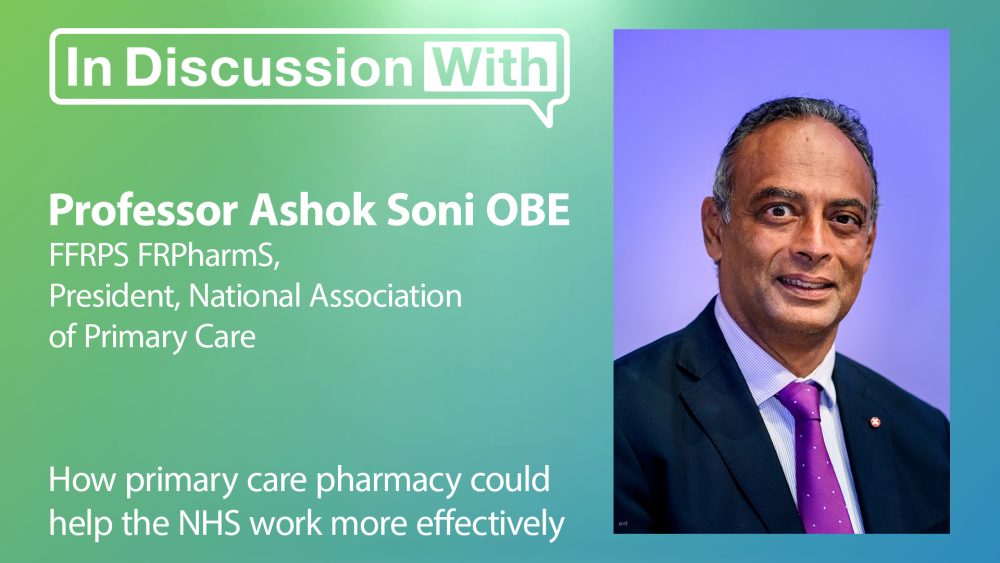Advertisment
How primary care pharmacy could help the NHS work more effectively

Professor Ashok Soni OBE is a community pharmacist and president of the National Association of Primary Care. He is also a non-executive director at Oxford University Hospitals and a non-executive director at Sussex Integrated Care Systems (ICS), known as NHS Sussex, where he chairs the Workforce and Remuneration body. In this series of short videos, he describes how the expertise of primary care pharmacy could be mobilised to help the NHS work more effectively.
Why pharmacists should manage repeat prescriptions
The current system for repeat prescriptions for patients with stable conditions requires them to return to the GP every 6-12 months even if nothing has changed. Allowing community pharmacists to manage repeat prescribing “would take a huge amount of workload off general practice and enable them to spend their time doing the things that they really are experts at doing”, he says. Community pharmacists, who are experts at managing medicines and medicines’ optimisation, could monitor patients effectively and manage medicines for those with stable conditions. Much of this could be done under agreed protocols and that could bridge the gap until all community pharmacists are prescribers, he argues.
Getting Serious Shortage Protocols (SSPs) to work
Medicines’ shortages are depressingly frequent and, despite the existence of Serious Shortage Protocols (SSPs) to ensure that alternative medicines are available when shortages occur, numerous problems have arisen. The SSP scheme is not as flexible and responsive as it needs to be and sometimes the way in which the schemes operate in practice simply leads to new shortages and delays in treatment. Pharmacists are clinicians who care about patients and need to be trusted to provide the appropriate alternatives when a specific product is unavailable, says Professor Soni. Patients do not want to be travelling back and forth between health care professionals trying to find a solution, “they want the solution in one easy place so let’s find ways that the patient has that access at the point they want it, in the way they want it”, he says.
Reducing harm from medicines and improving the patient experience
About eight per cent of hospital admission are due to medicines-related harm. This could be reduced by improving prescribing and pharmacy-led medicines optimisation initiatives. Such measure should release capacity for patient care. Ideally pharmacy services should be built in when new initiatives are planned. Although this did not happen for the covid vaccination campaign it quickly became apparent that without input from community pharmacy there would be insufficient capacity. Now, the majority of vaccine provision for covid is now delivered through community pharmacy, explains Professor Soni.
Integrating community pharmacy and primary care
The National Association of Primary Care (NAPC) is an organisation that is focused on the delivery of care outside hospital. As such it embraces all branches of health and social care, including the voluntary sector. It’s guiding principle is “about enabling people at local level to build things from the ground up”, says Professor Soni.
His closing message to the Secretary of State for Health and Social Care is, “All pharmacists have a role to play in supporting improving care. …… We want to be part of your solution – we can be part of your solution – but you have to include us for that to happen.”
Pharmacists have a role to play in supporting improving care. If you really want us to help, we can – just come and ask us, let us. We want to be part of your solution – we can be part of your solution – but you have to include us for that to happen.”
Read and watch the full series on our website or on YouTube.
This episode of ‘In Discussion With’ is also on Spotify. Listen to the full podcast now.





